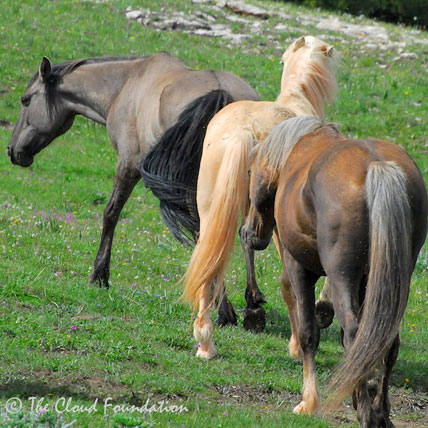Walking in the Clouds
7/9/14
Dear Friends of Cloud and his Pryor Mountain Herd,TCF Board Member, Linda Hanick and a close family friend of the Hanicks, Daniel Middleton, who is nearly 15 years old and over six feet tall, join me for a Pryor Mountain adventure. Intermittent sun, persistent rain, occasional fog, and one hail of a storm complete with lightning and ear-shattering thunder test our mettle and our ability to stay warm and dry.
Linda and Daniel drive the UTV, following me in the Durango as I creep up the increasingly rough, rock-strewn road on Tillett Ridge. We set up camp on top of the mountain near the snow-fed waterhole.
Snowdrifts linger behind our campsite, above the waterhole, and in many forested areas, reminders of the endless winter with above average precipitation and below average temperatures.
Above the snow-encircled teacup bowl, we spot Encore and her trio of bachelors, Knight, London and Inali. Encore looks well, better than in late May. Remarkably, she has survived what is unique in my twenty years of watching wild horses. I have never heard of a yearling filly being captured by a group of bachelor stallions.
I watch the stallions dutifully trailing after her. Is she really in charge of the band? I wonder. On the last day of my trip I get a definitive answer to my question.
We see Cloud every day and he seems totally recovered, running with his typical, easy grace. We watch him eyeing the big, dark bay bachelor, Grijalla, with his two young sidekicks, Cloud's son, Mato Ska, and Sante Fe's son, Mandan. Cloud dashes up the high hill to "greet" them. After a brief poop, sniff and spin, Grijalla backs away as Mato Ska sweetly mouths like a foal to his father. Satisfied he has made an impression, Cloud races back, throwing in a few flying lead changes for good measure.
But, in my opinion, the “life is good” award goes to Flint. I watch him staring at Hamlet, the newest band stallion on the mountain. Flint must think the big black is too close to his family and comes charging out. They do the standard mild display, but Flint notches up the excitement, rearing up at the much taller stallion. The two rear, turn, kick then rear and kick again. Flint might be small but he lets the six year-old know who is boss around here.
Then Flint takes off, racing at top speed toward the snow-fed water hole. He pivots as he kicks up his heels, and runs back to his family, stopping, stretching his neck high and letting out an explosive snort, as if to say Bring it on! His challenge is ignored by one and all. This son of powerful birth parents Sitka and Shaman, was raised by Cloud and Sitka. It's no wonder he is a spitfire.
Not one, but two foals are born during our stay. Two year-old Maia gives birth to a fragile bay colt, whose name is Oro. But, for now, I call the little colt, Orolitto. He is Galaxy’s first offspring. Both parents are clueless about caring for and protecting a newborn. Had it not been for grandma, Hera, I think Maia might have abandoned the tiny foal. Linda and Daniel and I watched Hera “teach” her daughter to stay close to the foal and to be patient.
The foal totters around looking for a meal from Hera and from Electra, Cloud’s little sister and Galaxy’s lead mare. Electra tells the foal to back off with a glare and ears laid flat. No response. She raises a hoof in warning. No response. Finally, when the foal keeps trying to nurse her, she pushes him back with her hoof and he crumples in a heap. I wonder if he will survive.
But by day two, Oro is still fragile but much stronger. Here he is, the third photo, with grandma Hera (on the left) and his mother, Maia.
Unlike Oro, the next foal born (discovered by Jack Sterling of Billings, MT) is the son of the experienced mare, Graciana, and her band stallion, Duke. Jack comes to tell us about his discovery and we join him, watching the foal nurse and totter around. Jack named the newborn, Odakota, which means "friend to all." What a lovely name.
By evening, Odakota is playing with his older sister, Outlaw, under the strict supervision of Graciana. As we watch the foals play, it starts to rain. Then the skies open up. Hail falls in sheets, covering the ground and making our campsite look like a mini-Mt. Everest base camp. I confess we wimped out, got in the Durango, and put on the heater.
It's no wonder that there are flowers everywhere with all the moisture the mountain continues to receive. A field of magenta Shooting Stars, typically late spring flowers, are in full bloom. The cold temperatures have delayed the ubiquitous purple Lupine that are just starting to bloom.
As in May, Bolder seems to be in a bit of trouble with his family. Four year-old Echo, who is still nursing his mother, has laid claim to Bolder’s grulla mare, Cedar. When Bolder tries to discipline him, Echo responds by laying his ears back disrespectfully and snaking Cedar away—not far away, but just far enough to defuse the situation. I have no idea how this whole affair will shake out, and am continually amazed that Bolder has not beaten Echo up. But, if Bolder does kick the brazen colt out, might he run the risk of losing Echo’s beautiful mother? Stay tuned!
During this visit I witness the rise of Doc. He has always been a marginal band stallion, at the periphery of the herd. But now, with the defeat of Cloud and the theft of Jackson’s band, he finds himself with the largest family group on the mountain. Whether he can keep this up remains to be seen. I watch him move Red Raven’s band and then Bolder and Custer’s families off the cool, bug-free snow bank. Never mind that there is plenty of room for all!
After Daniel and Linda leave, I stay on for a few days, visiting the Dryhead along the paved road in the early evening. At nearly the same time, a family of tourists and I notice Fiero's band standing atop a hill near the road. I lead the family around the hill to a place where they can see the horses without frightening them. The foal in the band, Oregon, the daughter of Sacajawea, is one of the only filly foals born this year in the Pryors.
Oregon is curious about us humans. She eyes us suspiciously as we stand frozen about 100 feet away. Then she walks closer. She stops and stares, then suddenly pivots, bucking as she races away. She did this twice to the delight of the five children in “my band.” I like to imagine Oregon as an adult mare, passing on her Spanish conformation and primitive coloration to the next generation of mustangs in this lowest area of the range.
My last afternoon on the mountaintop is the most exciting. I spot Cloud moving at a gallop to my left and Encore on my right. Can you see Cloud on the far left and Encore on the right? The filly bursts into a dead run. She’s trying to get back to her family!
In a matter of seconds Knight catches her, putting himself between Encore and Cloud with Inali defending the rear. Cloud gives chase.
Rather than fighting Inali, Cloud wisely retreats, returning to Feldspar, Ohanzee, and Ingrid. Clearly and sadly, Encore is not making all the decisions.
Aside from this dramatic incident and the violent weather, my visit is generally a very peaceful one. And it is the peaceful moments that stay with me—proud, resilient Cloud sleeping with his little son, Ohanzee, and grooming with Feldspar. . .
Baja's family quietly foraged in the wet limber pines. I'm always amazed at how perfectly the horses fit into their wilderness environment. I walk across a meadow between Bolder and Flint's bands and lay down, closing my eyes and just soaking in the sounds around me. I believe I am the only human on the mountain.
After a few minutes I sit up and see a young coyote trotting across the meadow toward me, oblivious to my presence. Was he hunting marmots just beyond on the cliff edges? Marmots are particularly abundant this year and I was lucky to get this shot of a mother and one of her babies in the early morning light.
Each morning, shortly after dawn I take a hike, and more than once spot mule deer bucks roaming with the horses. I can’t believe how much their antlers have grown in just the past few weeks.
As I start down the mountain, I stop to take one last look at the teacup bowl. A tiny Rock Wren sings atop a lichen-covered rock, its intricate, haunting song echoing across the bowl. Goodbye my friends I think as I reluctantly drive away.
Happy Trails! Ginger
P.S. As a returned native species, the mustangs of the West are a reminder of a time thousands of years ago when horses roamed by the millions with a laundry list of scary predators, and super-sized prey species. Most of these animals are now extinct, but, remarkably, the modern horses that died out only 7,500 years ago in North America returned with the Spanish in the 1500s. They went wild and thrived on their ancestral homelands. I hope you will join me in doing everything we can to make sure they continue to roam in precious freedom. View our Endangered Species Act Petition
And I hope you will join us for our Celebration of the Wild Horse Through Art and Music, a month long exhibit in Colorado Springs.






































